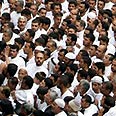
Archive photo: AP
Photo: AP
The largest survey to date of Muslims worldwide suggests the vast majority want Western democracy and freedoms, but do not want them to be imposed, BBC News reported Wednesday.
According to the report, the Gallup poll of more than 50,000 Muslims in 35 nations, which began following the 11 September 2001 attacks in the US, found that most of them "wanted the West to instead focus on changing its negative view of Muslims and Islam."
The overwhelming majority of those asked condemned the attacks on the US and subsequent attacks, citing religious reasons, the BBC News report said.
According to BBC News, the poll, which claims to represent the views of 90% the world's 1.3 billion Muslims, is to be published next month as part of a book entitled Who Speaks For Islam? What A Billion Muslims Really Think.
'Radicals are better educated'
BBC reported that according to the book, the survey of the world's Muslim community was commissioned by Gallup's chairman, Jim Clifton, shortly after US President George W Bush asked in a 2001 speech: "Why do they hate us?"
"Bush wondered why radical Islamist militant groups such as al-Qaeda hated democratically elected governments, as well as 'our freedom of religion, our freedom of speech, our freedom to vote and assembly and disagree with each other'," the report said.
BBC News quoted one of the book's authors, John Esposito, as saying says the survey's results suggest Muslims - even many of the 7% classing themselves as "radical" - in fact admire the West for its democracy and freedoms. However, they do not want such things imposed on them.
"Muslims want self-determination, but not an American-imposed and defined democracy. They don't want secularism or theocracy," the professor of Islamic Studies at Georgetown University in Washington was quoted as saying.
"What the majority wants is democracy with religious values."
Esposito was also quoted as saying by BBC News that "radical" Muslims believed in democracy even more than many of the moderate Muslims questioned.
"The radicals are better educated, have better jobs, and are more hopeful with regard to the future than mainstream Muslims," he said, "but they're more cynical about whether they'll ever get it."















